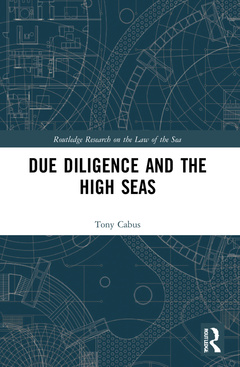Due Diligence and the High Seas Routledge Research on the Law of the Sea Series
Auteur : Cabus Tony

There has been a rapid growth of interest in due diligence, especially in the fields of environmental law and the law of the sea. Yet, confusion seems to surround this notion. Is due diligence a principle, a rule, a standard or something else? This book firstly explores thoroughly the concept of due diligence, its purpose and its mechanisms in order to propose a comprehensive theory of due diligence in harmony with the general law of State responsibility.
In the meantime, this book also explores the usefulness of due diligence to address modern challenges afflicting the high seas. Indeed, while the application of due diligence in transboundary contexts is well illustrated by jurisprudence, its applicability in areas beyond national jurisdiction remains unclear. Yet, a proper usage of this concept may be crucial for the protection of the high seas, as it allows for the intervention of international standards in this fragile area. Hopefully, the concept of due diligence can help compensate the insufficiencies of the United Nations Convention on the Law of the Sea concerning the high seas.
Examining in detail the theory of due diligence, this book will interest international lawyers concerned with this notion. It also offers a new perspective on the UNCLOS through the prism of due diligence and will interest lawyers dealing with the protection of the marine environment and fisheries.
Introduction
- A Rediscovered Concept
- A "Constitution for the Ocean in Search of Content
- Due Diligence: A Bridge Between Instruments and Actors
- Outline of the Thesis
Chapter I: The Development of the General Theory of Due Diligence
Introduction
Section 1: The Early Development and Evolution of the Concept of Due Diligence: From Early Theories to the ILC Codification
- The Theoretical Roots of Due Diligence: The State’s Responsibility for Acts of Private Actors
- The Early Judicial Practice on Due Diligence
- Conclusion
Section 2: The Work of the International Law Commission
- The Work of the ILC on State Responsibility
- The Work of the ILC on State Liability
- Conclusion
Chapter II: The Contemporary Conception of Due Diligence: Clarifications and Constitutive Elements
Introduction
Section 1: The No-Harm Rule Confusion
- The Tale of the Trail Smelter Arbitration
- The Corfu Channel Overinterpretation
- Conclusion
Section 2: Due Diligence: A Label of International Obligations
- Due Diligence: The General Aspects
- Due Diligence: Specificities of Environmental Law
- Conclusion
Section 3: The Definition of Due Diligence and its Potential for the High Seas
- Working Definition of Due Diligence
- The Utility of Due Diligence on the High Seas
- Conclusion
Chapter III: The Viability of Due Diligence on the High Seas
Introduction
Section 1: Legal Basis of Due Diligence Obligations on the High Seas
- The UNCLOS: A Primordial Framework
- The Compliance Agreement: Reinforcement of Effective Control
- The FSA: A Primary Tool for International Cooperation
- The Guidelines on Deep-Sea Fisheries
- The FAO Code of Conduct for Responsible Fisheries and the IPOA-IUU
- The Voluntary Guidelines for Flag State Performance: Filling the "Inability" Gap
- Conclusion: The Internal and External Interplay of the UNCLOS
Section 2: Due Diligence Obligations and Control on the High Seas
- Due Diligence and State-Owned Vessels
- Due Diligence and Private Vessels
- Conclusions on the Role of the Genuine Link
Chapter IV: Defining Due Diligence: From Interpretation to Law-Making
Introduction
Section 1: Due Diligence as an Informing Process
- From Interpretation to Law-Making
- The Critical Role of the Judge in the Determination of Diligence
- Conclusion
Section 2: Shaping the UNCLOS for Modern Challenges
- Informing the UNCLOS Through Due Diligence
- Gaps and Limits of Due Diligence
- Conclusion
Conclusion
Tony Cabus is a Post-Doctoral researcher at the Graduate School of International Cooperation Studies (GSICS) in Kobe University, Japan. His research focuses on the law of State responsibility and the law of the sea with the aim of providing solutions for a better protection of our oceans. He has obtained a PhD in international law from GSICS in Kobe University (2017-2020), a master degree in international and European law from both Grenoble-Alpes University (2014-2015) and Aix-Marseille University (2011-2012) in France, and, a Bachelor degree from the University of Picardy in Amiens. He was also a participant in the 2019 Summer Academy of the International Foundation for the Law of the Sea in Hamburg; and, an assistant in the 2017 edition of the International Symposium on the Arctic in Kobe. He was a beneficiary of the MEXT Scholarship from the Japanese Ministry of Education, Culture, Sports, Science and Technology and an awardee of the Ryoso Award from the Ryosokai association.
Date de parution : 01-2024
15.6x23.4 cm
Date de parution : 12-2021
15.6x23.4 cm
Thème de Due Diligence and the High Seas :
Mots-clés :
Due Diligence Obligations; ICJ; IUU Fishing; Transboundary Harm; High Seas; ITLOS; FAO Code; Trail Smelter Arbitration; Soft Law Instruments; Pulp Mills Case; Deep Sea Fisheries; Opinio Juris; Responsible Fisheries; ILC; Marine Environment; Genuine Link; Corfu Channel Case; Due Diligence Requirements; Flag State; High Sea Fisheries; Exclusive Economic Zone; High Seas Convention; IUU Fishing Activity; Due Diligence Duties; Coastal States


